- 中英文版中秋節(jié)詩句 推薦度:
- 相關推薦
中秋節(jié)的詩句英文
在生活、工作和學習中,大家一定都接觸過一些使用較為普遍的詩句吧,詩句飽含豐富的感情和想象。那什么樣的詩句才算得上是經(jīng)典呢?下面是小編整理的中秋節(jié)的詩句英文,希望對大家有所幫助。

《The Moon 月 》
Thy beauty haunts me heart and soul.
Oh your fair Moon,so close and bright;
Thy beauty makes me like the child,
That cries aloud to own thy light:
The little child that lifts each arm
To press thee to her bosom warm.
Though there are birds that sing this night
With thy white beams across their throats,
Let my deep silence speak for me
More than for them their sweetest notes:
Who worships thee till music fails
Is greater than thy nightingales.
意思是:
你的美縈繞我的心魂。
噢,你這美妙的月兒呀,如此地真切而明澈。
你的美麗讓我喜歡上了那個
歡叫著去捕捉你的光芒的孩子:
那小家伙張開雙臂,
將你擁入她溫暖的懷中。
今夜雖然也有鳥兒放聲歌唱,
你潔白的清輝浸潤著它們的歌喉,
而我以深深的沉默來表達心聲,
比那最委婉的吟唱蘊含更深:
若有人對你的熱忱連音樂都難以傳達,
此人對你的激情遠勝于那些夜鶯。
《太常引》
一輪秋影轉金波,飛鏡又重磨。
把酒問姮娥:被白發(fā)欺人奈何!
乘風好去,長空萬里,
直下看山河。斫去桂婆娑。人道是清光更多。
"Now primer"
(SONG) Xin Qiji
A video autumn to Jinbo, and re-mirror grinding.
Wine Q Heng-e: The hair deceptive regrettable!
Good to Feng, the sky Wanli,
Occurring Directly Beneath Big see mountains and rivers. To use GUI theater. Yes-more-humane.
1,人逢喜事尤其樂,月到中秋分外明。 People on every occasion, especially on Mid-Autumn festival particularly bright.
2,幾處笙歌留朗月,萬家簫管樂中秋。 Several strike stay long, xiao wind Mid-Autumn festival.
3,地得清秋一半好,窗含明月十分圓。 To better half clear autumn, window containing the moon is round
中秋節(jié)的來歷英語(雙語版)
The Mid-Autumn Festival falls on the 15th day of the 8th lunar month, usually in October in Gregorian calendar.
每年農(nóng)歷八月十五日,是傳統(tǒng)的中秋佳節(jié)。這時是一年秋季的中期,所以被稱為中秋。
The festival has a long history. In ancient China, emperors followed the rite of offering sacrifices to the sun in spring and to the moon in autumn. Historical books of the Zhou Dynasty had had the word "Mid-Autumn". Later aristocrats and literary figures helped expand the ceremony to common people. They enjoyed the full, bright moon on that day, worshipped it and expressed their thoughts and feelings under it. By the Tang Dynasty (618-907), the Mid-Autumn Festival had been fixed, which became even grander in the Song Dynasty (960-1279). In the Ming (1368-1644) and Qing (1644-1911) dynasties, it grew to be a major festival of China.
中秋節(jié)有悠久的歷史,和其它傳統(tǒng)節(jié)日一樣,也是慢慢發(fā)展形成的,古代帝王有春天祭日,秋天祭月的禮制,早在《周禮》一書中,已有“中秋”一詞的記載。后來貴族和文人學士也仿效起來,在中秋時節(jié),對著天上又亮又圓一輪皓月,觀賞祭拜,寄托情懷,這種習俗就這樣傳到民間,形成一個傳統(tǒng)的活動,一直到了唐代,這種祭月的風俗更為人們重視,中秋節(jié)才成為固定的節(jié)日,《唐書·太宗記》記載有“八月十五中秋節(jié)”,這個節(jié)日盛行于宋朝,至明清時,已與元旦齊名,成為我國的主要節(jié)日之一。
Folklore about the origin of the festival go like this: In remote antiquity, there were ten suns rising in the sky, which scorched all crops and drove people into dire poverty. A hero named Hou Yi was much worried about this, he ascended to the top of the Kunlun Mountain and, directing his superhuman strength to full extent, drew his extraordinary bow and shot down the nine superfluous suns one after another. He also ordered the last sun to rise and set according to time. For this reason, he was respected and loved by the people and lots of people of ideals and integrity came to him to learn martial arts from him. A person named Peng Meng lurked in them.
相傳,遠古時候天上有十日同時出現(xiàn),曬得莊稼枯死,民不聊生,一個名叫后羿的英雄,力大無窮,他同情受苦的百姓,登上昆侖山頂,運足神力,拉開神弓,一氣射下九個多太陽,并嚴令最后一個太陽按時起落,為民造福。后羿因此受到百姓的尊敬和愛戴,不少志士慕名前來投師學藝,心術不正的逄蒙也混了進來。
【中秋節(jié)的詩句英文】相關文章:
經(jīng)典英文詩句集錦06-13
優(yōu)美英文詩句03-14
泰戈爾的經(jīng)典英文詩句06-12
關于花的經(jīng)典英文詩句精選06-13
中英文版中秋節(jié)詩句140句08-08
英文愛情詩句經(jīng)典03-30
經(jīng)典英文愛情詩句03-29
英文經(jīng)典愛情詩句05-02
父愛的英文詩句110句06-12